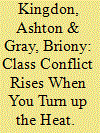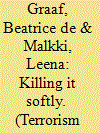|
|
|
Sort Order |
|
|
|
Items / Page
|
|
|
|
|
|
|
| Srl | Item |
| 1 |
ID:
188066


|
|
|
|
|
| Summary/Abstract |
The increasing impacts of climate change have created a global humanitarian crisis. Growing populations, unstable political structures, and competition over scarce resources are generating unprecedented levels of insecurity. Capitalising on these complex situations, terrorist organisations are using the environment as a weapon of war, exploiting the strains and grievances exacerbated by climate change to increase support, aid recruitment, and incite violence. Often neglected within contemporary analyses is the potential impact of anthropogenic climate change on left-wing terrorist organisations. Consequently, the research presented in this paper takes an interdisciplinary approach, combining terrorism studies with disaster management to examine a specific type of security crisis that exists in this overlapping relationship between climate change and left-wing conflict. Three regional case studies of terrorist groups and activity are examined in detail—the Revolutionary Armed Forces of Colombia, the Shining Path in Peru, and Naxalites in India. The article reveals the complex issues that underlie climate disasters, focusing on the impact hazards such as deforestation, rising sea levels, extreme weather, glacial retreat, drought, famine, water scarcity, and migration have on left-wing terrorist recruitment and activity.
|
|
|
|
|
|
|
|
|
|
|
|
|
|
|
|
| 2 |
ID:
099661


|
|
|
|
|
| Publication |
2010.
|
| Summary/Abstract |
This article seeks to provide a comprehensive analysis of the early demise of Rode Jeugd's initiatives towards a terrorist campaign in the Netherlands. It is concluded that three contextual factors played a crucial role in the process: the openness of the political culture, the setbacks experienced by similar organizations elsewhere (RAF in particular), and the lack of overt repression, combined with effective covert operations carried out by the security forces against the Rode Jeugd. Overall, the case of Rode Jeugd is a prime example of a demonstration of state power not always being the most efficient or even suitable method to combat terrorism.
|
|
|
|
|
|
|
|
|
|
|
|
|
|
|
|
|
|
|
|
|